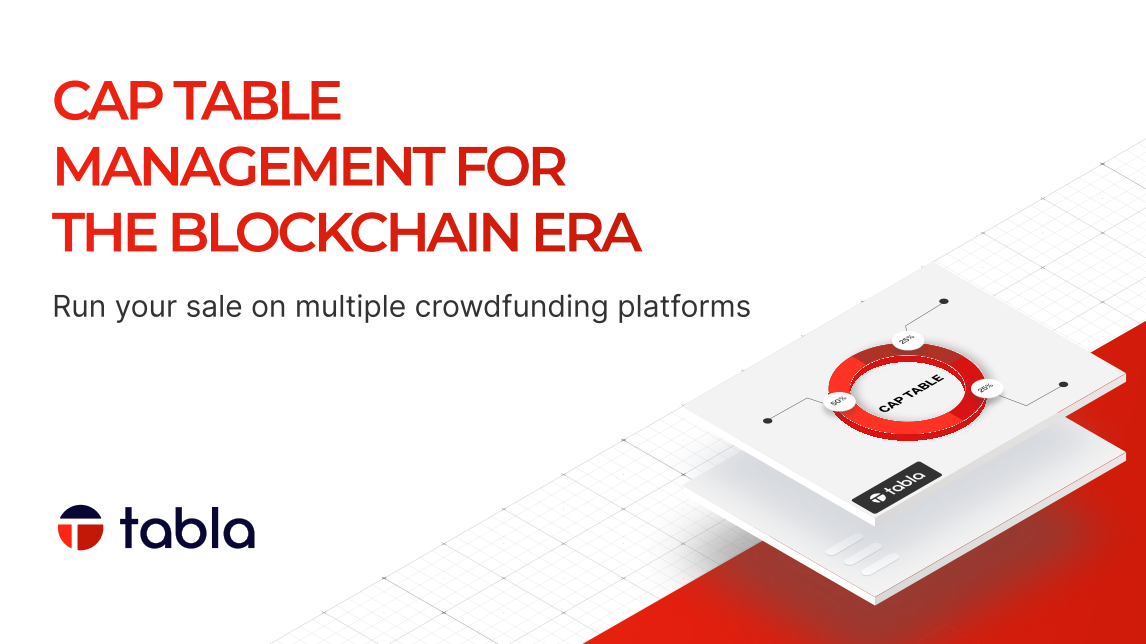The Future of Private Equity Trading: Tabla Protocol

Blockchain technology has revolutionized the way we think about finance and investing. With its decentralized and transparent nature, it has the potential to democratize access to financial markets and empower individuals to participate in investment opportunities previously reserved for only the wealthiest investors. One area that has seen significant development in this regard is the tokenization of shares and other financial instruments on public blockchains, and the use of smart contracts to enforce transfer restrictions and shareholder rights. This is where Tabla Protocol comes in.
Tabla Protocol is a leading tokenized stock protocol that enables the issuance of official shares, fund units, and other financial instruments on public blockchains. It uses smart contracts to automatically enforce transfer restrictions and shareholder rights, ensuring compliance with the requirements of Delaware Corporation Law, BVI Business Companies Act, and equivalent laws in multiple major jurisdictions. Your cap table is updated in real-time as trades occur, providing you with a legally valid record of ownership.
Key Benefits
One of the key benefits of Tabla Protocol is its compatibility with the ERC20 standard, which ensures ease of listing and compatibility with any major DeFi platform or cryptocurrency wallet. This makes compliance without compromise possible, and allows investors to access a global decentralized marketplace with ease. With Tabla Protocol, the whole process of investor onboarding and transaction execution is now digital and based on blockchain smart contracts. This reduces the cost of transaction close to zero, enabling $1 minimums for primary and secondary trading.
Tabla Protocol also offers fast liquidity, as investors can buy and sell multiple times per hour, thanks to the 24/7 nature of blockchain markets. The cryptographic proof of compliance provided by Tabla Protocol ensures that compliance of each transaction with the relevant rules is secured by the same amount of computing power as the network itself. This gives investors and regulators alike confidence in the security and transparency of the platform.
Benefits for Issuers
For issuers, Tabla Protocol provides access to a global decentralized capital market, making shares easily accessible for dozens of exchanges and various decentralized finance marketplaces around the globe. Since everyone is using the same shared ledger and ERC20-compatible standard, listing on a new exchange typically takes days instead of months. Automated KYC and compliance processes also make it easier to onboard investors and ensure compliance with regulatory requirements.
Benefits for Brokers
Brokers can benefit from Tabla Protocol by gaining access to a global pool of diverse investment products with minimal setup efforts. The cost of transactions is reduced to less than $1, thanks to the automation of the entire sales process, including client onboarding, paperwork, and trade execution. Smart contracts-based compliance rules ensure transfer and trading restrictions on the protocol level, eliminating the need to worry about hacks or human errors.
Benefits for Shareholders
Shareholders can complete transactions in minutes instead of weeks, and most investments become liquid in 6-12 months. Since the stocks are digital, they become tradable immediately after the expiration of the lock-up period, making it easier for investors to execute a broader set of trading strategies. With a $1 minimum investment requirement, entry-level investors can safely try out new investment opportunities.
Benefits for Regulators
In addition to being more efficient and cost-effective, the Tabla Protocol also offers benefits for regulators. With its smart contracts-based compliance rules, the protocol ensures transfer and trading restrictions on the protocol level, meaning that compliance can be proven with mathematical proof based on digital signatures. This helps to reduce the risk of human error or manipulation, increasing the trust and reliability of the system.
Regulatory agencies can also benefit from the full transparency of transaction and market activity that the Tabla Protocol provides. While investors' personal information remains private, all transfers and trades are recorded in real-time in the immutable ledger, available for anyone to access and verify. This makes it easier for regulatory agencies to monitor transactions of specific brokerage or security for suspicious activity and identify potential instances of fraud or other illegal activity.
Furthermore, the protocol enables infinite possibilities of monitoring automation. With real-time access to most of the trades and transfers across all market participants, a new generation of monitoring software and tools can be developed, including access to a real-time cap table, transaction activity of OTC markets, payments, and more. This not only increases the efficiency of monitoring, but also reduces the workload for regulatory agencies and increases their ability to quickly identify and respond to potential issues.
In conclusion, the Tabla Protocol is a revolutionary technology that offers a range of benefits for issuers, brokers, shareholders, and regulators. By enabling the issuance of official shares, fund units, and other financial instruments on public blockchains, the protocol allows for more efficient and cost-effective trading and provides greater accessibility and liquidity to investors. With its smart contracts-based compliance rules, the protocol ensures greater transparency and reliability, reducing the risk of human error or manipulation. As blockchain technology continues to evolve and become more widely adopted, the Tabla Protocol is poised to play an increasingly important role in the global financial ecosystem.
